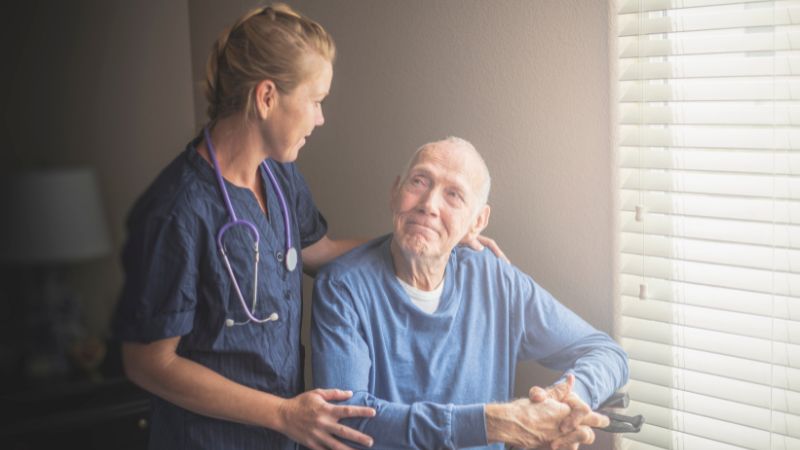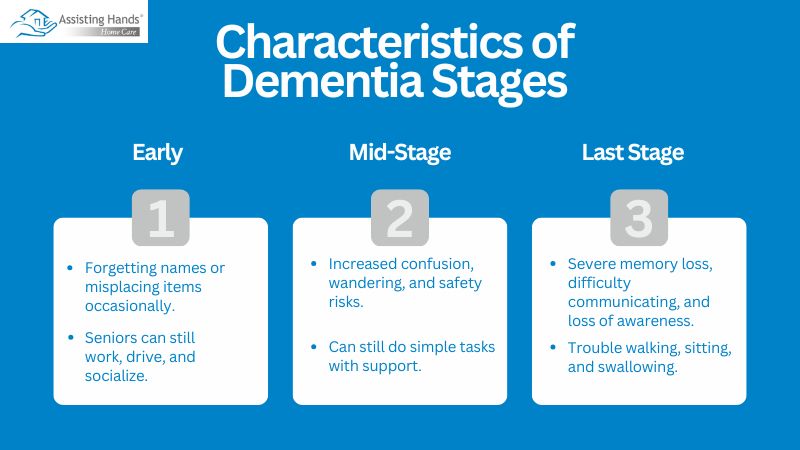

Dementia is a progressive condition, meaning symptoms worsen as time goes on. Seniors who are in the first stage of dementia continue to enjoy a level of autonomy; however, as their condition advances, they will eventually need 24-hour care.
Here is when 24-hour home care becomes necessary.
What is dementia?
A number of diseases cause dementia, which is an umbrella term defined by a loss of memory, problem-solving skills, and thinking abilities. Alzheimer’s disease is the most common cause of dementia. This condition is caused by abnormal changes in the aging adult’s brain.
Over time, the disease that triggers dementia causes the destruction of nerve cells and damages the brain. The cognitive impairment that results is accompanied by changes in mood, behavior, and emotional control. The individual gradually loses the ability to function independently.
Each senior diagnosed with dementia experiences symptoms differently. The rate at which dementia progresses also varies. A senior with dementia may live on average four to eight years after diagnosis, but some can live for up to 20 years, depending on different factors.

What is early-stage dementia?
As mentioned, older adults who receive a dementia diagnosis may be able to continue living independently. They may drive, work, and socialize without the disease interfering in their everyday functioning. This is known as the mild or early stage of dementia.
Symptoms, such as occasionally forgetting the names of people who were just introduced or misplacing a valuable object, are usually mild. Since the senior’s cognitive abilities are functional at the early stage, it is the right time to put legal, financial, and end-of-life plans in place.
What is mid-stage dementia?
Dementia in its middle stages demands an increased level of care from caregivers. Seniors can live for years in the middle stage, as it is typically the longest. Damage to the brain’s nerve cells makes it difficult for the older adult to perform everyday tasks without assistance.
Caregivers are necessary to provide a greater level of support. The senior will require assistance choosing clothing that is appropriate for the weather conditions or the occasion. The older person may need reminders to understand where they are or what day it is.
A senior in the mid-stage of dementia is more likely to wander and thereby become lost or injured. Ongoing supervision is critical for a senior who wanders. Safety is a priority, and the dementia patient should not remain alone at home.
In the middle stages, the dementia patient can still participate in everyday activities, albeit with assistance. Caregivers are encouraged to find ways to simplify tasks for the elderly individual and to find out what the senior can still do independently.
What is late-stage dementia?
As the senior enters the late stages of dementia, symptoms become severe. The older adult loses the ability to respond to the environment. The dementia patient is unaware of their surroundings and recent experiences. Communication skills deteriorate and conversations are a challenge.
In this final stage of dementia, the senior ultimately loses the ability to control bodily movements. Changes in physical abilities, such as walking, sitting, and standing, occur. Eventually, the senior’s ability to swallow also undergoes changes. At this stage, around-the-clock care is necessary.
When is 24-hour home care needed?
Safety Concerns
Safety is one of the primary reasons families turn to 24-hour care for their loved ones with dementia.
- Wandering Risks: As dementia progresses, many individuals develop a tendency to wander, often leaving their homes unsupervised. This behavior can lead to dangerous situations, such as getting lost, exposure to harsh weather, or accidental injuries. A 24-hour caregiver provides constant supervision to prevent wandering and ensures the senior remains safe and secure.
- Fall Prevention: Older adults with dementia are at a higher risk of falling due to mobility challenges, confusion, or poor balance. A 24-hour caregiver can create a safer living environment, assist with movement, and respond immediately in the event of a fall, reducing the chances of serious injuries.
Medication Management
Managing medications can become increasingly complex for individuals with dementia, as memory and thinking problems make it difficult to adhere to a prescribed schedule.
- Multiple Medications: Seniors often take several medications for various health conditions. Forgetting doses, taking incorrect amounts, or mixing medications can have severe consequences. A professional caregiver ensures that medications are administered on time and correctly, improving compliance and reducing health risks.
- Medical Monitoring: For patients with coexisting medical conditions, such as diabetes or hypertension, 24-hour caregivers can monitor symptoms, watch for side effects, and alert family members or healthcare providers to any changes.
Behavioral and Emotional Challenges
Behavioral changes are common in individuals with dementia, particularly in the moderate to severe stages.
- Sundowning: Many dementia patients experience increased confusion, anxiety, or agitation during the evening, a phenomenon known as sundowning. A 24-hour caregiver is trained to manage these behaviors effectively, providing reassurance and a calming presence.
- Emotional Support: Seniors with dementia often feel isolated or frustrated due to their condition. A caregiver offers companionship and emotional support, which can improve their overall well-being.
Long-Distance Caregiving
When family members live far away, providing adequate care for a loved one with dementia becomes increasingly difficult.
- Supervision Challenges: Progressing symptoms, such as wandering or forgetting to eat, require constant monitoring, which is nearly impossible to provide from a distance. A 24-hour caregiver bridges this gap, ensuring that the senior’s needs are met even when family members cannot be present.
- Relief for Families: Long-distance caregiving can lead to significant stress and worry. Hiring a professional caregiver provides families with peace of mind, knowing their loved one is in capable hands.
Incontinence and Personal Care Needs
As dementia advances to the later stages, personal care needs increase significantly.
- Bladder and Bowel Incontinence: Incontinence becomes more common in advanced dementia, requiring prompt attention to maintain hygiene and prevent skin infections. A 24-hour caregiver provides assistance with toileting and ensures that the senior remains clean and comfortable throughout the day.
- Bathing and Dressing: Activities of daily living, such as bathing, grooming, and dressing, may become overwhelming for both the patient and family caregivers. Round-the-clock care ensures that these essential tasks are handled with dignity and compassion.
Caregiver Burnout
Family members often step into the role of primary caregiver, but the physical and emotional demands of caregiving can quickly lead to burnout.
- Signs of Burnout: Feelings of exhaustion, frustration, or being overwhelmed are common among family caregivers. When caregiving becomes too much to handle, transitioning to 24-hour professional care allows families to focus on their own well-being while ensuring their loved one receives high-quality care.
Call Assisting Hands Home Care for Your Loved-One
Receiving care at home is the most preferred option for seniors with dementia. They are able to age in place, in surroundings that are familiar and comforting. Moving to a memory care facility, on the other hand, can become disorienting to dementia patients.
When an aging loved one has been diagnosed with dementia, it is important for families to develop a care plan. Assisting Hands Home Care offers a range of compassionate care services to ensure the senior in your life experiences comfort, health, and well-being.
Our live-in and 24-hour home care services are ideal for seniors who require constant supervision. Dementia patients who wander, for instance, benefit from ongoing monitoring by our professionals. Live-in care is also ideal for seniors who have returned from a hospital stay and need help at home to recover.
Seniors living with chronic conditions utilize our 24-hour home care. Multiple caregivers are assigned to the care recipient, alternating shifts every 8 to 12 hours to give the care recipient constant attention. Seniors who need memory care also benefit from 24-hour care at home.
Care responsibilities include helping with personal hygiene tasks, medication reminders, meal preparation, and transportation to areas in the community. We shop for groceries, perform light housekeeping, and assess the home for fall risks. Caregivers also provide transfer assistance and companionship.
Assisting Hands Home Care professionals are trusted by families with seniors living in Palos Heights, Illinois, and the surrounding neighborhoods. Caregivers are bonded, licensed, insured, and trained in CPR and First Aid.
Schedule a free in-home consult at (773) 207-3767 and learn how our senior home care services can support your aging loved one.
